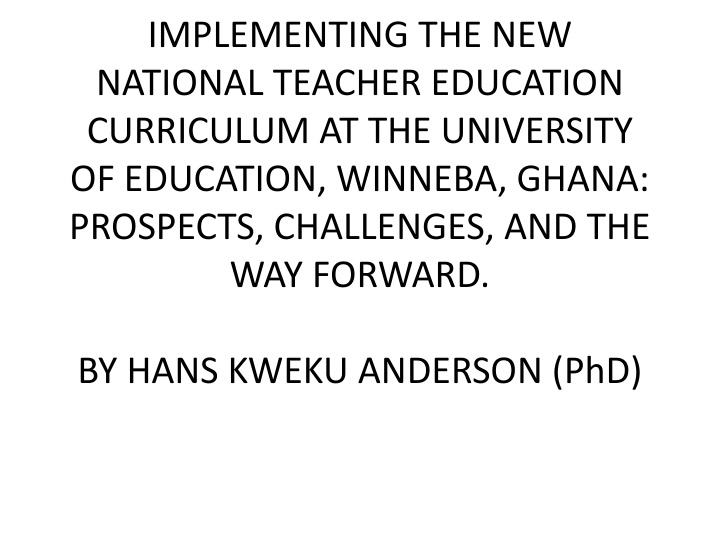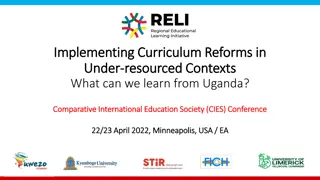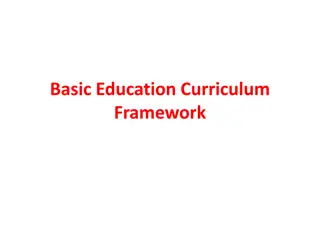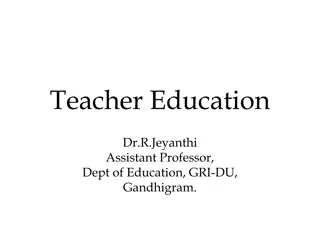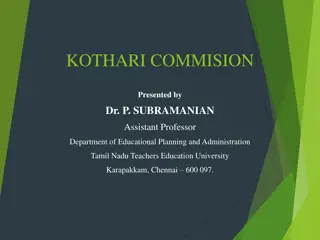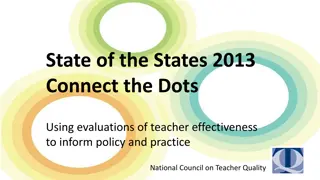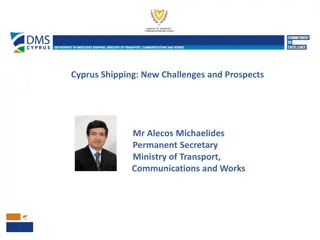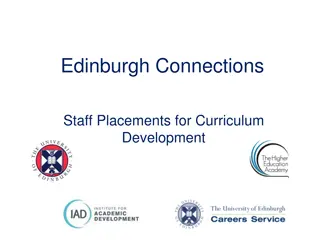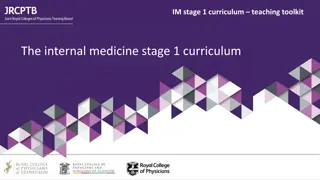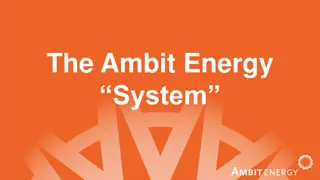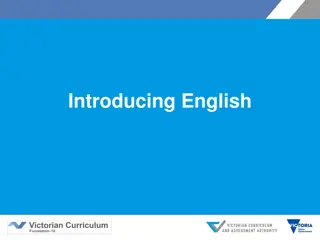Challenges and Prospects of Implementing New National Teacher Education Curriculum at University of Education, Winneba, Ghana
This presentation by Hans Kweku Anderson (PhD) explores the background, literature review, problem statement, research questions, methodology, results discussion, and recommendations regarding the implementation of the new national teacher education curriculum at the University of Education, Winneba, Ghana. It delves into past educational reforms in Ghana, theoretical frameworks, and challenges faced in curriculum implementation.
Download Presentation

Please find below an Image/Link to download the presentation.
The content on the website is provided AS IS for your information and personal use only. It may not be sold, licensed, or shared on other websites without obtaining consent from the author.If you encounter any issues during the download, it is possible that the publisher has removed the file from their server.
You are allowed to download the files provided on this website for personal or commercial use, subject to the condition that they are used lawfully. All files are the property of their respective owners.
The content on the website is provided AS IS for your information and personal use only. It may not be sold, licensed, or shared on other websites without obtaining consent from the author.
E N D
Presentation Transcript
IMPLEMENTING THE NEW NATIONAL TEACHER EDUCATION CURRICULUM AT THE UNIVERSITY OF EDUCATION, WINNEBA, GHANA: PROSPECTS, CHALLENGES, AND THE WAY FORWARD. BY HANS KWEKU ANDERSON (PhD)
PRESENTATION OUTLINE Background to the study. Review of related Literature. Problem statement. Research Questions/Hypothesis. Methodology Discussion of Results. Conclusion/Recommendations.
Background to the Study Curriculum reform is a global phenomenon. Some Past Educational Reforms in Ghana 1. Governor Guggisberg s reforms (Sixteen principles of educ. 2. The Accelerated Development Plan of 1951 and Educational Act of 1961. 3. Reform of the National Liberation Council (1968). 4. The New Structure and Content of Education (1974)
Background to the Study (contd.) 5. The 1987 Educational Reform. 6. The 2007 Educational Reform. (Adu Gyamfi et al., (2016) Teacher Education Reforms 7. Education Act in 2008 (Act 78). 8. Colleges of Education Act in 2012. 9. Pre Tertiary Teacher Professional Development and Management (PTPDM) Policy in 2012.
Background to the Study (contd.) 10.The 2019 Educational Reform. Ensuring teacher quality (Prempeh, 2019, p.3) The Colleges of Education in Ghana, the University of Cape Coast and the University of Education, Winneba, etc.
Review of related literature Literature was reviewed on curriculum implementation Putting the curriculum into action for attainment of the goals for which it is designed (Ali and Ajibola , 2015) . Mkpa, as cited in Onyeachu (2008) explained curriculum implementation as the act of translating the curriculum document into the operational curriculum The open use of the planned material in the entire nation (Lewy, as cited in Anderson, 2002). Theoretical framework of the study. (Rogan and Grayson s (2003) Theory of curriculum implementation for developing countries).
Statement of the Problem Problems of curriculum implementation are global in nature (Cheung and Weng, 2012). Problems of most programmes arise at the implementation stage ( Ikechuku & Chukwuemeka, 2013). The implementation of the NTSC begun in UEW when not all the needed preparations for effective implementation (Anderson, 2017; Adentwi, 2000; Fullan, 1982) had been put in place. To ascertain the state of the implementation of the New Curriculum in UEW, Winneba.
Research Questions/Hypothesis 1. How prepared are the implementers of the new National Teachers Standard Curriculum in the University of Education, Winneba? 2. What facilities are available for the implementation of the new National Teachers Standard Curriculum in the University of Education, Winneba? 3. What are the learners contributions to the implementation of the new National Teachers Standard Curriculum in the University of Education, Winneba? Hypothesis HO1: Demographic characteristics of implementers (sex, age, academic qualification) will not statistically significantly predict their level of preparedness.
Methodology Descriptive research design and Sequential mixed methods approach (Caruth, 2013). Instruments: Questionnaire and semi structured interview guide. Sampling technique: Purposive sampling technique. Sample: 250 students, 32 lecturers = 282. Data analysis: Means and Standard Deviations, pattern marching-descriptive/explanatory (Onwuegbuzie and Combs, 2011; Yin, 1994 ) , multiple regression.
Results/Findings Students Demographics More females (157) than males (93) Ghana Web (2020). 1. More male lecturers (24) than females (8). African Higher Education Summit (2015). Lecturers Demographics 2. Majority of the lecturers are within the age range of 41 50. Rambiasz (2017)
Results/Findings Research Question1(Implementers pred ness) The implementers appeared highly prepared in terms of: academic training, clarity about the Supported Teaching in Schools (STS), the methodological strategies suggested for teaching the curriculum, have had in-service training. (Cheung & Weng, 2012, Onyeachu, 2008)
Results/Findings Research Question 2 (Availability of facilities) There is: space for teaching and learning purposes, time to prepare and deliver the content of the NTS Curriculum, ability to complete the prescribed content, availability of internal support and external supports, availability of the required resources. (Rogan & Grayson, 2003; Wang, 2006)
Results/Findings Not everything is available. For instance, when teaching Science, I have to take the students to the Science Department for practicals. To be able to get lecturers for all the courses, I borrow lecturers from other Departments. Sometimes, there is no space to place a projector because of large class size. There is no external support in any way to the Department for the implementation of the New Curriculum. ITECPD ( Institute for Teacher Education and Continuous Professional Development) comes round from time to time to monitor.
Results/Findings Research Question 3(Learners contributions) The students are both regular and punctual at lectures. They actively participate in group work. They understand the content of the Curriculum and the STS. They have the required ICT gadgets (Android phones and laptop). Their lecturers are punctual and regular at lectures. (Sahinto et al., 2016)
Results/Findings (Hypothesis) Generally, the implementers demographic variables were good indicators of their level of preparedness in the implementation of the new curriculum, hence, the null hypothesis that demographic characteristics of implementers (sex, age, academic qualification ) will not statistically significantly predict their level of preparedness is not supported while the alternate is supported.
Results/Findings Challenges 1. The STS poses problem to the students. 2. Inadequate teaching space and large class size. (Ayemi & Olowe, 2016)
Conclusion The implementation of the New Teachers Standard Curriculum at the University of Education, Winneba, Ghana, is going on effectively even though there are challenges militating against it.
Recommendations Management should provide enough lecture halls that are spacious for lectures. Time-tabling for STS should be re-considered for students by the planners. The Director of ITECPD should liaise with the Municipal Education Directorate on how to have a successful STS.
References Addi Raccah. (2005). A. Gender and Teachers' Attrition: The Occupational Destination of Former Teachers. Sex Roles 53, 739 752 (2005).Retrieved on July 13, 2020 from https://doi.org/10.1007/s11199-005-7738-z Adentwi, K. I. (2000). Curriculum development. An introduction. Kumasi, Ghana: SKIES Printing Works. African Higher Education Summit (2015). Revitalizing Higher Education for Africa s future. Retrieved on July 9, 2020 from https://www.opportunitiesforafricans.com/2015-african-higher- education-summit-revitalizing-higher-education-for-africas-future-dakar-senegal/ Anderson, H. K. (2002). The implementation of the music and dance programme in basic schools. The case of the Awutu, Effutu, Senya District of theCentral Region. Unpublished master s Thesis. University of Cape Coast, Cape Coast, Ghana. Ali, A. A. & Ajibola, A. L. (2015). Issues and prospects of effective implementation of new secondary school curriculum in Nigeria. Journal of Educational Practice, 6(30), 29-39. Ayeni, O. G. & Olowe, M. O. (2016). Implication of large class size in the teaching and learning of Business Education in Tertiary Institution in Ekiti State. Journal of Education and Practice, 7(34), 65 69. Bediako, S. (2019). Models and concepts of curriculum implementation, some definitions and influence of implementation. Retrieved on July 9, 2020 from https://www.researchgate.net/publication/333338710_Models_and_concepts_of_curriculum_impl ementation_some_definitions_and_influence_of_implementation Caruth, G. D. (2013). Demystifying mixed methods research design: A review of the literature Mevlana International Journal of Education (MIJE). 3(2), 112 122. Cheung, C. K. & Weng, M. W. (2012). Factors affecting the implementation of curriculum reform in Hong Kong: Key finds from a large scale survey study. International Journal Management, 26(1), 39-54. Chikumbi, N. and Makamure, T. (2005). Training teachers for quality education in Europe European. Journal of Teacher Education, 25(1), 11-17.
